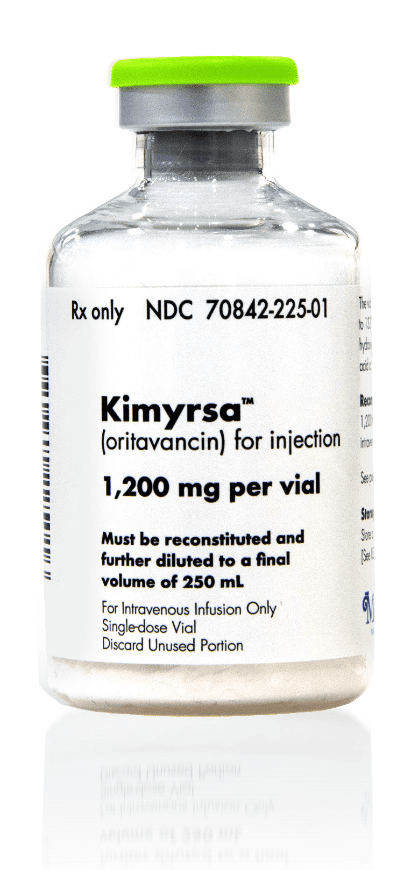Oritavancin
Generic name: oritavancin [ or-IT-a-VAN-sin ]
Brand names: Kimyrsa, Orbactiv
Dosage form: intravenous powder for injection (1200 mg; 400 mg)
Drug class: Glycopeptide antibiotics
What is oritavancin?
Oritavancin is an antibiotic that is used to treat severe skin infections caused by bacteria.
Oritavancin may also be used for purposes not listed in this medication guide.
Oritavancin side effects
Get emergency medical help if you have signs of an allergic reaction: hives; difficult breathing; swelling of your face, lips, tongue, or throat.
Some side effects may occur during the injection. Tell your caregiver right away if you feel warm, itchy, dizzy, light-headed, sweaty, or have chills, tremors, chest pain, back pain, a rash, or redness in your face or upper body.
Oritavancin may cause serious side effects. Call your doctor at once if you have:
-
severe stomach pain, diarrhea that is watery or bloody (even if it occurs months after you receive oritavancin); or
-
pain, tenderness, redness, swelling, or warmth anywhere in your body.
Common side effects of oritavancin may include:
This is not a complete list of side effects and others may occur. Call your doctor for medical advice about side effects. You may report side effects to FDA at 1-800-FDA-1088.
Related/similar drugs
Warnings
Tell your doctor if you use other medicines or have other medical conditions or allergies.
Before taking this medicine
You should not receive oritavancin if you are allergic to it, or if you will be using "unfractionated" heparin within 5 days after your receive oritavancin injection.
Tell your doctor if you have ever had:
-
an allergic reaction to medicines such as dalbavancin, telavancin, or vancomycin; or
-
if you use a blood thinner (such as warfarin) and you have routine "INR" or prothrombin time tests.
Tell your doctor if you are pregnant or breastfeeding.
Oritavancin is not approved for use by anyone younger than 18 years old.
How is oritavancin given?
Oritavancin is injected into a vein by a healthcare provider, usually as a single dose.
oritavancin is injected slowly over 3 hours.
Call your doctor promptly if your symptoms do not improve after receiving oritavancin.
Oritavancin can affect the results of certain medical tests for up to 5 days after your injection. Tell any doctor who treats you that you have been treated with oritavancin.
Oritavancin dosing information
Usual Adult Dose for Skin and Structure Infection:
1200 mg administered as a single dose via IV infusion over 1 hour (Kimyrsa) or 3 hours (Orbactiv)
Comment:
-This drug is available as 2 different products that have different strengths (400 and 1200 mg), duration of infusion (1 or 3 hours), and preparation instructions. The manufacturer product information should be consulted.
-This drug should be given as a single dose.
-To reduce the development of drug-resistant bacteria and maintain the effectiveness of this antibacterial drug and others, use this drug only to treat or prevent infections that are proven or strongly suspected to be caused by bacteria.
Use: For the treatment of acute bacterial skin and skin structure infections due to susceptible isolates of Staphylococcus aureus (including methicillin-susceptible and methicillin-resistant isolates), Streptococcus pyogenes, S agalactiae, S dysgalactiae, S anginosus group (includes S anginosus, S intermedius, and S constellatus), and Enterococcus faecalis (vancomycin-susceptible isolates only)
What happens if I miss a dose?
Since oritavancin is given in a single dose, it does not have a daily dosing schedule.
What happens if I overdose?
In a medical setting an overdose would be treated quickly.
What should I avoid after receiving oritavancin?
Avoid taking anti-diarrhea medicine without first asking your doctor. Diarrhea may be a sign of a new infection.
For at least 5 days after receiving oritavancin, avoid using heparin.
What other drugs will affect oritavancin?
Sometimes it is not safe to use certain medications at the same time. Some drugs can affect your blood levels of other drugs you take, which may increase side effects or make the medications less effective.
Tell your doctor about all your other medicines, especially:
This list is not complete. Other drugs may affect oritavancin, including prescription and over-the-counter medicines, vitamins, and herbal products. Not all possible drug interactions are listed here.
More about oritavancin
- Check interactions
- Compare alternatives
- Reviews (2)
- Side effects
- Dosage information
- During pregnancy
- Drug class: glycopeptide antibiotics
- Breastfeeding
- En español
Patient resources
Other brands
Professional resources
Other brands
Related treatment guides
Further information
- Your doctor can provide more information about oritavancin.
Remember, keep this and all other medicines out of the reach of children, never share your medicines with others, and use this medication only for the indication prescribed.
Always consult your healthcare provider to ensure the information displayed on this page applies to your personal circumstances.
Copyright 1996-2025 Cerner Multum, Inc. Version: 5.01.

